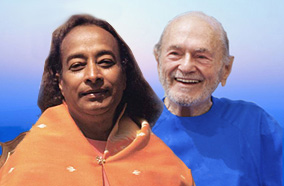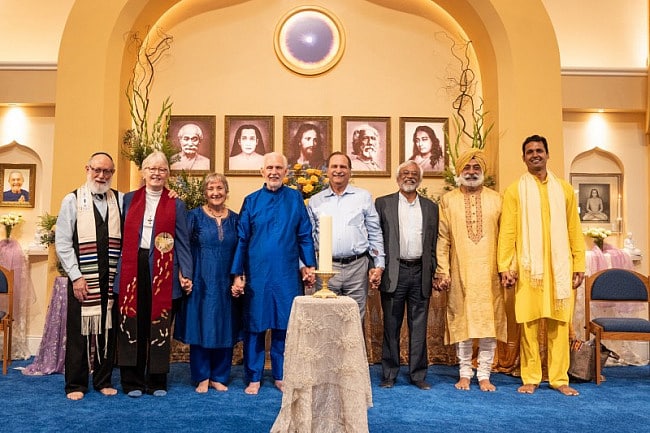(Excerpted from the Essence of Self-Realization—Wisdom of Paramhansa Yogananda, compiled by Swami Kriyananda, Crystal Clarity, Publishers)
“Self-realization,” a phrase commonly used today, implies many things that are very attractive—expansive horizons for personal growth; freedom from institutional and dogmatic constraints; direct personal experience of Truth and of God.

Paramhansa Yogananda, the well-known author of Autobiography of a Yogi, often spoke of Self-realization which he defined in this way, “Self-realization is the knowing in all parts of body, mind, and soul that you are now in possession of the kingdom of God; that you do not have to pray that it come to you; that God’s omnipresence is your omnipresence; and that all you need to do is improve your knowing.”
Self-Realization Is Not Ego Worship
You may find a contradiction between the idea of “Self-realization” and the idea of worshipping God. A college student once asked Yogananda this very question.
“I am intrigued by the concept of Self-realization. However, I don’t see how you tie it in with worship. Surely it isn’t your teaching that we should worship ourselves!
“But isn’t that what everyone does?” asked Paramhansa Yogananda with a humorous smile. “That is the very essence of delusion: to idolize the ego; to pour out libations to it, pamper it, sing praises to it!
“Worship means to seek identity with the object of one’s concentration. On the path of Self-realization, the devotee seeks to transfer his identity from the little ego to the infinite Self. Philosophically, then it is valid to worship that greater Self.
“This is a difficult concept, however, for the human mind to grasp. One may affirm, ‘I am infinite,’ but without humility and devotion one slips all too easily into the error of thinking, ‘I, in my exceptional greatness, am one with Infinity!’
All are manifestations of the one divine Self.
“For this reason it is better, until one is highly advanced spiritually, not to think of God as, ‘I,’ but to address Him as ‘Thou.’ It is also more natural to think in this way. After all, as human beings we see others as separate from ourselves, even though, spiritually speaking, all are manifestations of the one divine Self. We don’t ask a friend how he is by saying, ‘How am I today?’ To do so would be confusing even for a philosopher! Instead, we say ‘How are you?’
“An ‘I-and-Thou’ relationship with God is simpler, and less confusing. It is also much more satisfying to the human mind. And it is a relationship that God recognizes.
“The Lord responds to sincere devotion from His human children, never to proud self-affirmation.”
Truth Is Eternal
Yogananda also said, “Self-realization has come to unite all religions.”
Considering that Yogananda founded an organization called “Self-Realization Fellowship,” one might think of this as a typical dogmatic assertion. “My way is right and soon all of you will agree!”
But such a point of view is inconsistent, in fact absurd, in the context of Yogananda’s broad, universal view of spiritual truth. His autobiography is a virtual textbook for the movement away from dogmatism into a more experiential basis for spiritual life.
Theological explanations address the intellect, but not the soul.
“Theological explanations address the intellect, but not the soul. Thus, the final ‘proofs’ of one sect are frequently seized upon by the opposing sects as their ‘disproofs.’ In Self-realization alone is complete certainty attained. Every question that man ever asked of Truth is answered clearly and fully in divine communion.”
Many who strive sincerely to achieve unity among religions, do so by attempting to blend together the best of practices and beliefs of each one. The result is usually highly unsatisfactory for them all. Yogananda’s approach was completely different. His was to seek the underlying truth, unchanged by man’s limited ability to comprehend it in its fullness.
 “The truths underlying religion are eternal,” Yogananda said. “They cannot be invented. From their source in the realization of God-enlightened masters, they become diluted by their contact with unenlightened human beings.
“The truths underlying religion are eternal,” Yogananda said. “They cannot be invented. From their source in the realization of God-enlightened masters, they become diluted by their contact with unenlightened human beings.
“That is why God from time to time sends His awakened sons back to earth, to revive the spirit of religion and to return the timeless teachings to their pristine purity.
“There will always be differences of emphasis, according to the varying needsof the times. The fundamental truths, however, remain forever the same.”
The Fundamental Reality—Divine Love
Yogananda’s disciple, Kriyananda, describes it this way. “The deepest truths of religion are all of them quite simple. They have been obscured by the outer structures of religion, which have become so complex in religion’s struggle against a multiplicity of challenges as to create confusion and divisiveness, not clarity. Of all the institutions of mankind, religion ought to be the most unitive. Yet people fight, persecute one another, and go to war over their religious differences—all these in the name of God who, so all of them claim, is a God of Love.
It is time again to explore man’s inner relationship with his Creator.
“It is time again to explore man’s inner relationship with his Creator. Jesus Christ said, ‘Behold, the kingdom of God is within you.’ He said also, ‘Destroy this temple, and I will raise it up again in three days.’ The Bible tells us he was referring not to the temple at Jerusalem, but to the temple of his own body. The inference is obvious. For worship is conducted inside a temple, not outside it. The true goal of pilgrimage, so the Indian Scriptures declare, is within. What matters in religion, then, is not the outer place of worship, nor the outer rituals, nor even the particular system of beliefs (which are, after all, only definitions formulated by human beings), but a person’s own direct, actual, inner experience of God and Truth.
“According to every saint who has experienced this sublime awakening, God is simple: Man is complex.
“The demands of Truth are that religion become simple once again. Religion must return to the fundamental reality, divine love. It must return to man’s need for direct personal experience of that love.
“Divine work is not converting others. It is living and expressing divine love.”
Way-Showers on the Path of Self-Realization
In 1933, Yogananda wrote an article called “A New Awakening in the Churches,” in which he described the way he thought religion should develop in the West.
Religious groups and ministers of religion should work to develop a more scientific outlook. Their commitment should be to expanding their understanding of the truth, not to protecting their already-formulated definitions of it. They should reason as scientists do, impartially. As scientists test their hypotheses regarding material realities, so religionists should test their beliefs by psychological and spiritual experimentation. They should try to demonstrate how spiritual laws, such as faith and charity, actually work in human lives.
Instead of peddling untested dogmas and urging people to ‘Believe — believe!’, the churches should convert their premises into Universities of Living, where experiments are conducted on how to find the true fulfillment in life that all people seek.
It is time religionists everywhere—Protestants, Catholics, Jews, Buddhists, Shintoists, Muslims, Jains, Zoroastrians, Hindus—ceased vaunting the superior merits of their own creeds and holy writ. Science has conditioned people to resist having their minds stuffed with dogmas. It is time that religious leaders nourished people—the young, especially—with inwardly stimulating discoveries of universal wisdom. Religionists should pool their discoveries, just as scientists do.
The different religions in the world today do good, of course in reminding people of their need to live more in the consciousness of God, and of goodness and Truth. If the churches would be of real service to humanity, however, they must offer people practical spiritual training for achieving those ends.
Instead of gathering in God’s name theoretically, people need to come together with the firm purpose of invoking His living presence in the Temple of Meditation. Those who do so will find themselves actually experiencing the blessing of the Divine Presence.
Religious teachers should cease concentrating on the outward forms of religion. They should cease being sect-makers and dogma-builders. Instead, they should become soul-awakeners: way-showers on the path to Self-realization. They should seek to become open conduits for universal Truth. Instead of holding people by insisting on the superiority of their own teachings and systems of belief, they should inspire in each member the desire to strive toward his own Self-realization in God.
Inner Communion
A visitor once asked Yogananda, “Is your teaching a new religion?” Yogananda replied, “It is a new expression of truths that are eternal.”
I was sent that people might learn how to commune with God directly.
“I wasn’t sent to the West to dogmatize you with a new theology,” he said on another occasion, “[I was sent] that people might learn how to commune with God directly.”
“The true basis of religion is not belief, but intuitive experience. Intuition is the soul’s power of knowing God. To know what religion is really all about, one must know God.
“Faith is different from belief. Faith is rooted in experience. Belief is provisional faith. “Belief is necessary in the beginning. Without it, people wouldn’t trouble to seek God. Mere belief, however, is not enough. When people remain satisfied with their beliefs, their religion becomes dogmatic, and therefore closed to further growth.
“I say, make spiritual practice, not belief, your ‘dogma.’ Don’t remain satisfied even with regular meditation, until you have found God.”
The Blind Men and the Elephant
The folly of pitting one view of God against another is illustrated by Yogananda’s re-telling of the classic tale of the blind men and the elephant.
“An elephant driver had six sons, all of them blind. One day he gave them the job of washing his elephant. When the brothers had completed the task, they began discussing what manner of animal was the elephant.
“‘Easy!’ said one. ‘The elephant is a couple of large bones.’ He’d been washing the tusks.

“‘How can you say such a thing?’ remonstrated another. ‘The elephant is like a thick rope.’ He’d been washing the trunk.
“‘The third son insisted that the elephant was like a couple of fans. He’d been washing the ears.
“To the fourth son, the elephant resembled four pillars. He’s been washing the legs.
“The fifth son had been washing the sides. He described the elephant as a wall that breathed.
“The sixth and last cried, ‘You boys can’t fool me! I know. My own experience has revealed to me that the elephant is a little piece of string hanging down from the sky.’ He’d been washing the tail.
“As each son expressed his own opinion more insistently, there developed a heated argument. After some time, the father walked in and heard them shouting at one another. Listening to this swelling tide of bigotry, he cried, laughing,
‘My sons, you are fighting over nothing!’
“‘Nothing?’ one of them shouted. ‘My brothers are all liars, and here they have the audacity to call me one!’
“‘My dear children,’ said the father placatingly, ‘each of you has washed only a part of the elephant, but I alone have seen it in its entirety. It is everything that each of you says it is, but,’ he added, ‘it is also much more than any of you suspect.’”
“He went on to describe to them what the elephant really looked like. ‘So you see, my sons,’ he finished, ‘you are all right—but you are also all wrong!’”
“Such is the case with God,” concluded Sri Yogananda, “and with the approaches to Him that are taken by the different religions. God is One, but the paths to Him are many. Countless, too, are the ways in which He may be described.
“The wise see God everywhere—even in those who don’t know Him at all.”

One Comment
Multiple plates of information Otherwise Beautiful post .